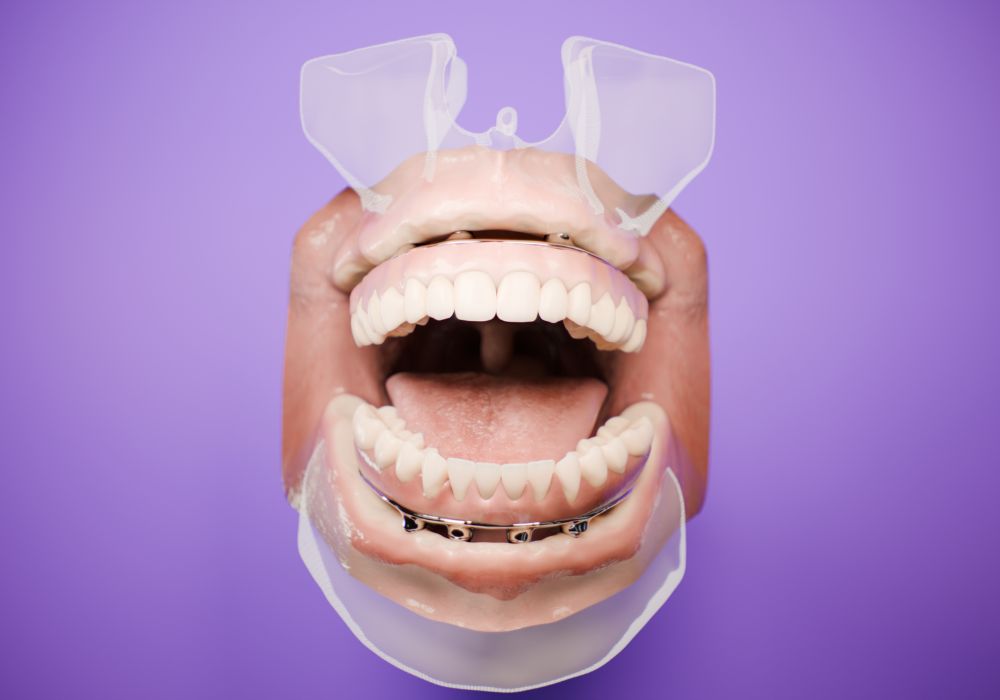Can I Have Dental Implants With Gum Disease?
This article aims to delve into the relationship between gum disease and dental implants. We will explore how gum health impacts the feasibility of receiving implants, discuss the necessary preparatory steps for those with gum disease, and highlight the considerations and adjustments needed to ensure the success of dental implants.


Research different options to find the right pediatrician
Amet mauris lectus a facilisi elementum ornare id sed sed aliquet dolor elementum magnis quisque id ultrices viverra cursus nunc odio in egestas consectetur cras consequat sodales netus pretium feugiat nulla semper senectus bibendum ornare sit adipiscing ut atid viverra donec nunc, donec pulvinar enim ac habitasse fermentum amet praesent atac elementum id sed nibh diam ultrices nibh enim volutpat varius et est sed vestibulum neque.
- Neque sodales ut etiam sit amet nisl purus non tellus orci ac auctor
- Adipiscing elit ut aliquam purus sit amet viverra suspendisse potent
- Mauris commodo quis imperdiet massa tincidunt nunc pulvinar
- Excepteur sint occaecat cupidatat non proident sunt in culpa qui officia
Check credentials and licensing
Lorem ipsum dolor sit amet, consectetur adipiscing elit, sed do eiusmod tempor incididunt ut labore et dolore magna aliqua. Ut enim ad minim veniam, quis nostrud exercitation ullamco laboris nisi ut aliquip ex ea commodo consequat.
Vitae congue eu consequat ac felis placerat vestibulum lectus mauris ultrices cursus sit amet dictum sit amet justo donec enim diam porttitor lacus luctus accumsan tortor posuere praesent tristique magna sit amet purus gravida quis blandit turpis.

Ask friends and family for recommendations
Ornare sit adipiscing ut atid viverra donec nunc, donec pulvinar enim ac habitasse fermentum amet nunc praesent atac elementum id sed nibh diam ultrices nibh enim volutpat varius et est sed vestibulum neque.
Amet mauris lectus a facilisi elementum ornare id sed sed aliquet dolor elementum magnis quisque id ultrices viverra cursus nunc odio in egestas consectetur cras consequat sodales netus pretium feugiat nulla semper senectus bibendum.
“Duis aute irure dolor in reprehenderit in voluptate velit esse cillum dolore eu fugiat nulla pariatur excepteur sint occaecat cupidatat non proident, sunt in culpa qui offi.”
Look for experience in treating your child's age
Duis aute irure dolor in reprehenderit in voluptate velit esse cillum dolore eu fugiat nulla pariatur. Excepteur sint occaecat cupidatat non proident, sunt in culpa qui officia deserunt mollit anim id est laborum.
- Neque sodales ut etiam sit amet nisl purus non tellus orci ac auctor
- Adipiscing elit ut aliquam purus sit amet viverra suspendisse potenti
- Mauris commodo quis imperdiet massa tincidunt nunc pulvinar
- Adipiscing elit ut aliquam purus sit amet viverra suspendisse potenti
Consider location and availability
Duis aute irure dolor in reprehenderit in voluptate velit esse cillum dolore eu fugiat nulla pariatur excepteur sint occaecat cupidatat non proident, sunt in culpa qui officia deserunt mollit anim id est laborum.
Lorem ipsum dolor sit amet, consectetur adipiscing elit, sed do eiusmod tempor incididunt ut labore et dolore magna aliqua. Ut enim ad minim veniam, quis nostrud exercitation ullamco laboris nisi ut aliquip ex ea commodo consequat.
Making informed decision
Gum disease, a prevalent condition affecting millions worldwide, often raises concerns among patients about their eligibility for dental implants. This issue is especially pressing for those who have experienced significant tooth loss and are seeking stable, long-term replacements. The question arises: Can individuals with gum disease successfully undergo dental implant procedures? This article aims to delve into the relationship between gum disease and dental implants.
We will explore how gum health impacts the feasibility of receiving implants, discuss the necessary preparatory steps for those with gum disease, and highlight the considerations and adjustments needed to ensure the success of dental implants. Our goal is to provide clear, actionable information for those contemplating this transformative dental solution, helping them make informed decisions about their oral health and treatment options.
Understanding gum disease
Gum disease, also known as periodontal disease, is a common but serious condition that affects the supporting structures of the teeth, including the gums and the jawbone. It typically progresses through various stages, starting with gingivitis and potentially advancing to more severe forms like periodontitis.
Gingivitis is the earliest stage of gum disease, characterised by redness, swelling, and bleeding of the gums. It is usually caused by the accumulation of plaque, a sticky film of bacteria that forms on the teeth. Gingivitis is generally reversible with good oral hygiene and professional dental cleaning.
Periodontitis occurs when untreated gingivitis progresses, causing inflammation and infection to spread from the gums to the bone that supports the teeth. This stage is marked by the formation of pockets between the gums and teeth, which collect more bacteria. Over time, these infections can lead to the destruction of the gum tissue and bone, ultimately causing tooth loss.
The effects of gum disease extend beyond discomfort and cosmetic issues. If left untreated, the condition can lead to significant oral health problems, including tooth mobility, severe pain, and increased risk of tooth loss. Additionally, periodontal disease has been linked to systemic health issues such as heart disease, diabetes, and respiratory conditions, underscoring the importance of maintaining good periodontal health.
Understanding these stages and effects is crucial for anyone considering dental implants, as the presence of active gum disease can significantly impact the success of implant procedures. Proper management and treatment of gum disease are essential before proceeding with implants to ensure the long-term health and stability of both the implants and the patient’s overall oral health.
Dental implants and gum disease: The challenges
The relationship between gum disease and dental implants is complex and fraught with challenges. Gum disease, particularly in its advanced stages, significantly complicates the placement and long-term success of dental implants for several key reasons:
Compromised Bone Quality: One of the most significant impacts of advanced gum disease is bone loss in the jaw. Dental implants require a strong and healthy bone structure for placement and stability. When gum disease leads to bone degradation, it compromises the implant’s ability to securely integrate into the jaw, known as osseointegration. Without sufficient bone density, the risk of implant failure increases substantially.
Increased Infection Risk: Active gum disease means that there is an ongoing bacterial infection in the gums. Introducing dental implants into this infected environment can lead to implant-related infections such as peri-implantitis. This condition is similar to periodontitis but affects the tissues surrounding dental implants. Peri-implantitis can cause further bone loss and, if not managed promptly, may lead to implant failure.
Poor Healing Capacity: Gum disease affects the body’s ability to heal and regenerate tissues. For dental implants to be successful, the body must be able to heal effectively around the implant post, securing it into the jawbone. Inflammation and infection associated with gum disease can impair this healing process, jeopardising the integration of the implant.
Highlighting the Risks of Implant Failure
The presence of active gum disease elevates the risks associated with dental implant procedures, including:
Implant Loss: The most direct risk is the loss of the implant itself, which can occur if the bone fails to integrate properly with the implant or if an infection develops around the implant site.
Additional Complications: Besides implant loss, patients with gum disease may face longer healing times, increased discomfort, and the potential for recurring infections that can affect not only the implants but also other natural teeth and oral structures.
Financial and Emotional Costs: Implant failures require additional procedures, which can be financially and emotionally taxing. This can lead to frustration and disappointment for patients hoping for a lasting solution to their dental issues.
Given these challenges, it’s clear that addressing gum disease prior to implant surgery is crucial. Effective management and possible treatment of gum disease can mitigate these risks, enhancing the success rate of dental implants and ensuring better overall oral health outcomes for patients.

Evaluation and treatment planning
Before proceeding with dental implants, a thorough evaluation is crucial, especially for patients with a history of gum disease. This evaluation process is multifaceted, focusing on both the current status of the patient’s oral health and the likelihood of successful implant integration.
Evaluation process for dental implant candidates
1. Comprehensive Oral Examination: Initially, the dentist conducts a detailed examination of the patient’s mouth, including the gums, remaining teeth, and jawbone. This examination helps to identify any active gum disease, assess the extent of any bone loss, and determine the overall health of the oral cavity.
2. Imaging Studies: X-rays and, more commonly, 3D imaging techniques such as cone beam computed tomography (CBCT) scans are used. These imaging tools provide crucial insights into the bone quality and quantity available for implant placement. They allow the dentist to visualise the jawbone in three dimensions, which is vital for planning implant placement and ensuring there is adequate bone to support the implants.
3. Periodontal Assessment: Patients with a history of gum disease require a detailed assessment of their gum health. This includes measuring the depth of the gum pockets, checking for bleeding on probing, and assessing any gum recession. These indicators help gauge the severity of gum disease and the potential for successful implant integration.
Determining implant viability
Bone Density Analysis: The quality and density of the jawbone are assessed to ensure it can support dental implants. If bone loss has occurred due to gum disease, additional procedures such as bone grafting might be necessary before placing implants.
Gum Health Evaluation: Healthy gums are essential for the success of dental implants. If signs of active gum disease are present, these issues must be addressed and brought under control before proceeding. Treatments might include scaling and root planing, antibiotics, or more advanced periodontal therapy.
Risk Assessment and Customisation of Treatment Plans: Based on the findings from the oral examination, imaging, and gum assessment, the dentist will develop a customised treatment plan. This plan considers all risk factors associated with gum disease and bone health. It outlines the preparatory steps needed before implants can be safely placed, such as treating any residual gum disease or enhancing the bone structure.
The careful evaluation and detailed treatment planning ensure that dental implant procedures are tailored to meet the specific needs of patients with a history of gum disease, maximising the chances of success and long-term implant stability. This meticulous approach is crucial for achieving optimal results and ensuring that the dental implants enhance the patient’s oral health and overall quality of life.
Long-term care and maintenance
Ensuring the longevity and success of dental implants hinges significantly on diligent long-term care and maintenance. Proper oral hygiene practices, combined with regular professional follow-up care, are essential to maintaining both the health of dental implants and any remaining natural teeth.
Maintaining Oral Hygiene: The foundation of dental implant longevity is robust oral hygiene. Patients must adopt a comprehensive oral care routine that includes brushing twice daily, flossing daily and using antimicrobial mouth rinses.
Regular Professional Check-Ups: Routine dental check-ups are critical for assessing the health of dental implants and the surrounding tissues.
Importance of Professional Dental Cleanings: Professional dental cleanings are not just about keeping the teeth and implants clean; they play a crucial role in preventing diseases that can lead to implant failure. These cleanings help to remove plaque and tartar and identify potential issues early.
Personalised Follow-Up Care Plan: Depending on the individual’s oral health status, lifestyle factors, and the complexity of the dental implant procedure, the dentist may recommend a personalised follow-up care plan. This might include more frequent check-ups and cleanings for patients who are at higher risk of dental issues due to factors like diabetes, smoking, or a history of gum disease.
By adhering to these long-term care and maintenance practices, patients can significantly enhance the durability and functionality of their dental implants. Regular oral hygiene combined with professional monitoring and maintenance ensures that dental implants continue to provide a stable, functional, and aesthetic solution for many years.
Taking the first step
If you’re considering dental implants or have concerns about your gum health and its impact on potential implant procedures, it’s crucial to get professional advice tailored to your specific needs. We encourage you to schedule an appointment with a periodontist or implant expert. These professionals focus exclusively in the health of the gums and the placement of dental implants, making them your best resource for assessing your suitability for implants and addressing any existing periodontal issues.
During your consultation, your expert will evaluate your oral health, discuss your medical history, and help you understand the best options available based on your specific condition and goals. Whether you’re dealing with gum disease or simply exploring your options for replacing missing teeth, a detailed consultation will provide you with the insights and confidence to make informed decisions about your dental care.
Don’t wait to take the first step towards improving your oral health and reclaiming your smile. Contact your dental professional today to learn more about how dental implants can enhance your quality of life.

Exploring your options or wanting to find out what we are up to? We are active on social media and regularly post educational videos as well as resources.
Not ready yet?
That’s okay, you’re not alone...
Join our Facebook Patient Group, a safe and supportive space where you can connect with others who share your questions and concerns, and hear from people who’ve already been through the journey themselves.
Who better to talk to than those who truly understand?
Book your free clinical assessment.
Start your journey to a new smile. During the assessment, you will have the opportunity to meet with one of our skilled clinicians and discuss your treatment options in detail. The assessment is free of charge, and there is no obligation to proceed with treatment. Reach out to us to take the first step towards the future you.
Not ready yet?
That’s okay, you’re not alone...
Join our Facebook Patient Group, a safe and supportive space where you can connect with others who share your questions and concerns, and hear from people who’ve already been through the journey themselves.
Who better to talk to than those who truly understand?

.png)



